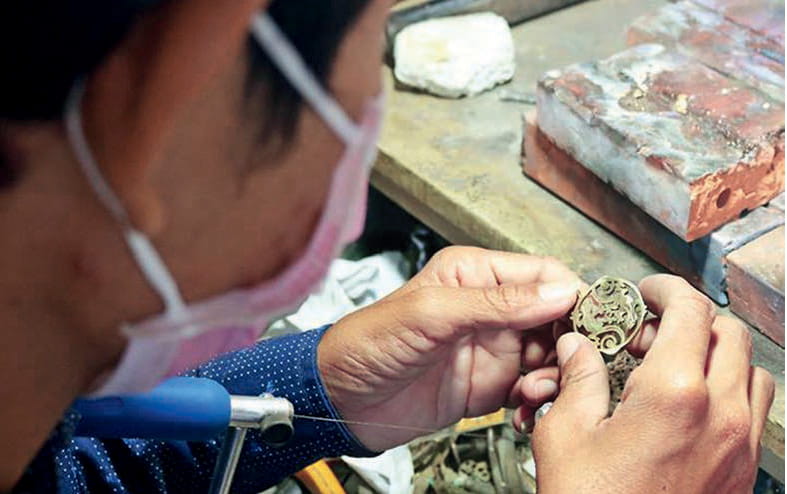Stories > Handcrafted with Heart
Handcrafted with Heart
Local online jewellery company Ethical Chic specialises in ethically sourced designs. Owner Geraldine Goh shares how her business is helping to bring about positive change in underprivileged communities.
BY SASHA GONZALES
PHOTOS ETHICAL CHIC

Artisans connected to Ethical Chic are guaranteed proper working conditions, fair pay, and access to tools and training, and retain creative control over the designs they produce.
aunched in 2016, Ethical Chic is an online jewellery store that retails beautiful handmade pieces by rural, mostly female, artisans from around the world. Its founder, Geraldine Goh, had read an article about fair trade and was disturbed that artisans in developing countries were often paid next to nothing and forced to work in small, cramped, unventilated spaces, and unsafe buildings.
Her research revealed two non-governmental organisations (NGOs) in Phnom Penh, Cambodia, that were creating job opportunities for rural artisans in their local communities. Inspired by the possibility that she, too, could bring about positive change, Goh launched Ethical Chic “with the aim of making a difference, and creating a platform for these artisans to reach a wider market”.
Goh has no design experience, but her background in marketing and merchandising has been crucial. “I’m skilled in relationship management and assortment planning, which is the process of determining what to sell and when to sell it, and I’ve applied both these skills to my business.”
Ethical Chic features handcrafted bangles, earrings, necklaces, pendants, and rings. Its Smith collection is produced by artisans from around the world, including India and Thailand, using traditional methods, while its Peace collection is made by Cambodian artisans using objects of war from the 1970s, like artillery and bullet cartridges. These objects are melted down and then moulded and polished into brass jewellery. Goh leaves the designs entirely up to the artisans.
No two pieces are identical and everything is made in small batches, but the true value of the jewellery is that the pieces are ethically sourced with the help of partners who share her values. Both her current partners are NGOs that she found through careful online research. They market the jewellery on the artisans’ behalf. One sources jewellery from home-based artisans; the other has a workshop where the jewellery is made and an on-site retail store that sells the finished pieces. Goh works with them to ensure items are procured in a sustainable manner, and ensures the artisans have clean, well-lit, and safe workspaces, and are paid fairly for their craft.
This sustainable business model doesn’t just ensure Ethical Chic’s longevity. Goh explains: “Our fair trade efforts have a ripple effect, because when the artisans can make a decent living, it empowers them and helps boost their personal well-being, the well-being of their families, and that of their communities as a whole. Ethical sourcing is also closely related to slow fashion, in which items are not mass produced. This means less waste and less impact on the environment.”
She also sources some of her products via an online platform associated with a reputable non-profit educational organisation, whose name she wishes to keep private. The platform creates an avenue for artisans who reside in remote rural areas and do not have the means to reach out to international markets. The artisans are paid fairly and have control over the pricing of their work. “By continuing to purchase from the artisans, we are providing not only financial support but also recognition for their craft,” Goh says.
“...We Now Have Jobs, And The Artisans On My Team Have Money To Continue Their Education And Help Their Families Live The Way They Want.”
Thoeun Chantha, Cambodian Srtisan
MEANINGFUL CONNECTIONS
Working closely with her partners ensures that Goh has a better understanding of how and where her jewellery is made, and of the artisans who make them. On her last trip to Cambodia, she got to visit the workshops and find out how her partner provides job opportunities – for instance, interested individuals with no jewellery making experience are taught the skills they need to create designs that sell.
Goh also forges meaningful connections with her partners and artisans. On the same Cambodia trip, she visited an artisan who started his own jewellery business, purchased a few pieces from him, and gave him market feedback.
The artisans value the connections they’ve made with her, too. Says Cambodian artisan Thoeun Chantha: “Working with Geraldine has helped me so much that I’ve been able to employ a few artisans myself. Thanks to her support, we now have jobs, and the artisans on my team have money to continue their education and help their families live the way they want. It’s always been my dream to help my community, and, with Geraldine’s vision, my goal seems within reach.”
Ethical Chic is still a new company, but it’s already making an obvious impact. “My business model is simple, but the platform I’ve set up showcases the products these artisans make, and with the money they earn, they can buy whatever they need,” Goh says. “It helps them live better lives.”
And she has big plans to take the business to the next level. “I intend to travel to more countries to help underprivileged artisans,” she shares. “I also hope to design my own line of jewellery and commission artisans to make it for me.”
